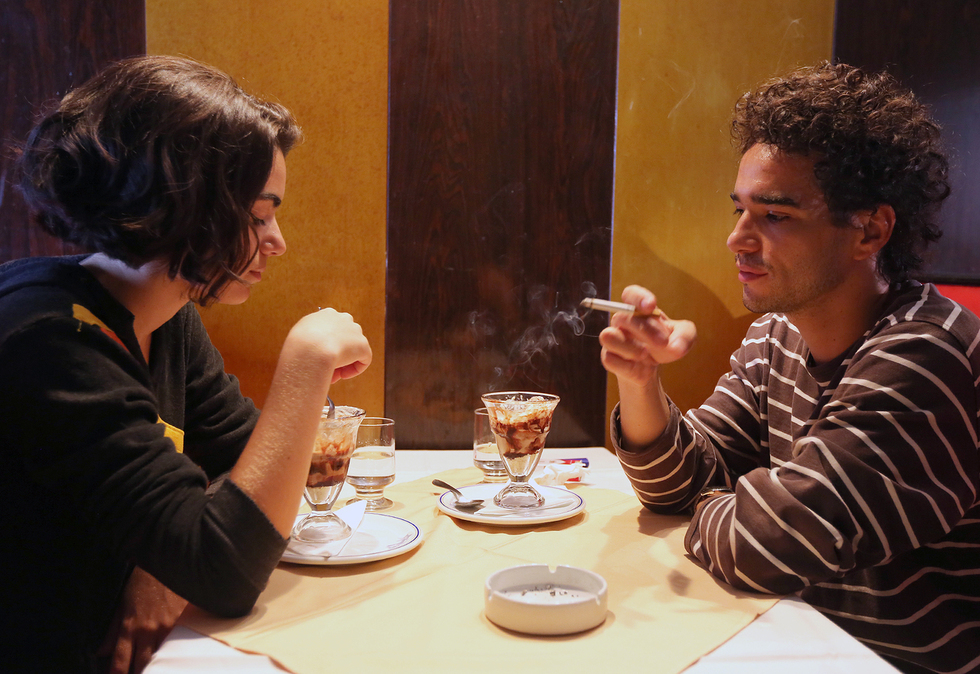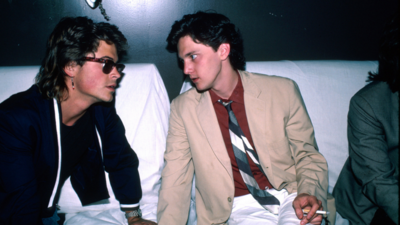
BY CAMILA RODRIGUEZ |
5 Tribeca Directors Talk About Their Biggest Challenges
Water buffaloes, David Bowie, The Cure, and more posed big problems for some of Tribeca 2016's filmmakers. Here are their stories.

It's hard to decide what's tougher: crashing your production van into a gigantic water buffalo in the middle of the Amazon, or securing the rights to a Bowie song? As spectators watching movies from the comfort of our seats, it's easy to overlook just how challenging making a film can be.
We asked five Tribeca directors what their biggest obstacle was when making their films, and what they did to overcome it.

Marina Person, Califórnia: The biggest challenge was the soundtrack. I had 15 songs to clear rights, and eight of them were international. I had songs by David Bowie, The Cure, New Order, Joy Division, and Cocteau Twins. Bands like The Smiths and Talking Heads were impossible to get, but we managed to clear the most important ones: The Cure's "Caterpillar" and "Killing An Arab," and David Bowie's "Five Years." The latter was the most difficult one, and was cleared only two months before Bowie's death. I really needed these songs in the film, so I never gave up, even with all the difficulties. I wrote personal letters to both Robert Smith and David Bowie, telling them how important they were to me, and how big was their role in my teenage years.
Buy tickets for Califórnia here.

Tracy Droz Tragos, Abortion: Stories Women Tell: The biggest obstacle was the women's mistrust of me—actually, there was mistrust on both sides. Honestly, I was sometimes fearful of what I was doing; the gravity of what I was asking of these women, especially in Missouri, was almost overwhelming. Access to my subjects was hard-earned. Many patients were grateful that I was making the film but couldn't consent to being on camera; they feared the repercussions they would face in their small towns or from their families, or that they would lose their jobs. The shame runs deep and makes the climate for reproductive health so much harder. The impact of not having free will, and of being ashamed of your choices, is corrosive to women's hearts and souls. It keeps women subjugated in a very real way. I saw that again and again in Missouri.
Buy tickets for Abortion: Stories Women Tell here.

Matteo Norzi, Icaros: A Vision: The obstacles have been humongous: as difficult as pushing a ship to the other side of a mountain, given that we were shooting in the surrounding of the city of Iquitos, where Werner Herzog's Fitzcarraldo was shot. This is a city that is not connected to the outside world with roads. The only way to reach it is by plane or upriver by boat. The film's heavy equipment was hijacked by drug dealers on a barge moving up the Ucayali River on its way to the set. We had to begin shooting without grip, lights, generator, tripods etc., readjusting and readjusting a very tight shooting schedule since the very first day. Meanwhile, the barge was sequestered by the naval marine: the production crew finally rescued the equipment truck late one night.
On the way back, at around 2 a.m., the production van crashed into a dark gigantic water buffalo standing in the middle of the road. The buffalo walked off. We had to replace the van. More over the jungle has the ability to bring out from everybody his or her deepest fears. For example, the production manager, who's scared of spiders, found a family of tarantulas nesting in her bed. The shamans had to work out a weeklong treatment to overcome the terror of our makeup artist after a giant bat attacked her. The data-manager was hospitalized with a very high and mysterious jungle fever. And so on. Co-director Leonor Caraballo meanwhile was dealing with the biggest of the obstacles: her body was in pain because of the tumors and the fatigue of the shoot. Her courage and dedication to the project together with the generosity and talent of her husband and art-partner Abou Farman, the producer, inspired every member of the crew to raise the stakes and overcome the daily problems.
Buy tickets for Icaros: A Vision here.

Sara Taksler, Tickling Giants: There's a lot of anxiety in Egypt that you are being observed by the government. I was staying in the hotel where the Al Jazeera team was arrested, and there was a general feeling of fear for anyone filming anything. One of my camera guys was beaten up when he filmed people watching Bassem's show. We didn't mention this project at all on social media while we were filming, out of an abundance of caution. As time went on, we filmed outside less and less because of arrests of camera people in Egypt. For this reason,I shot most of the b-roll on my little point and shoot, from a moving car.
All of this concern was compounded by me being a female, traveling alone. One night, while eating a late dinner at my hotel, a man at the table next to me stared at me the whole time. When I left the restaurant he followed me around for 10 minutes, whichever way I turned. I was afraid to leave the lobby. Then, Bassem happened to call. When I told him what was going on, he laughed and said, "He wants you, baby! He's flirting with you!" Everyone at the office the next day confirmed Bassem's suspicion. There were certain cultural norms I had to get used to.
Buy tickets for Tickling Giants here.

Kristi Jacobson, Solitary: When we set out to make this film, many told us that filming inside of a supermax would be impossible; these prisons are known as "black sites" by the journalists covering this issue, who have worked tirelessly and doggedly for decades to expose what goes on inside. After a fortuitous introduction to a state Department of Corrections Commissioner in the state where we ultimately filmed, we began an honest conversation around the use and impact of solitary confinement. The Commissioner was committed to structural and cultural change that would reduce the use of the practice, and after a few conversations, I asked if we could come to film. He responded openly, and next were a series of phone conversations and a scout to the prison. Three days of filming turned into over a year of filming inside the prison, a prison that journalists had been kept out of since it opened in 1998. I would say the "how" we overcame the obstacle was a combination of persistence, curiosity, authenticity, and luck.
Buy tickets for Solitary here.


